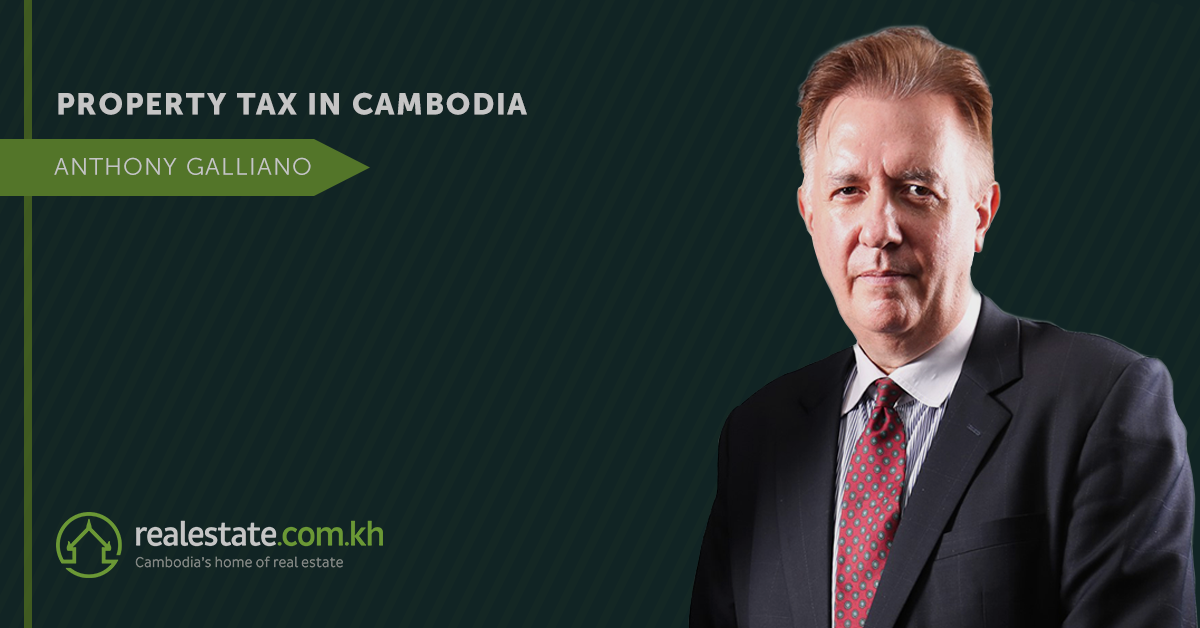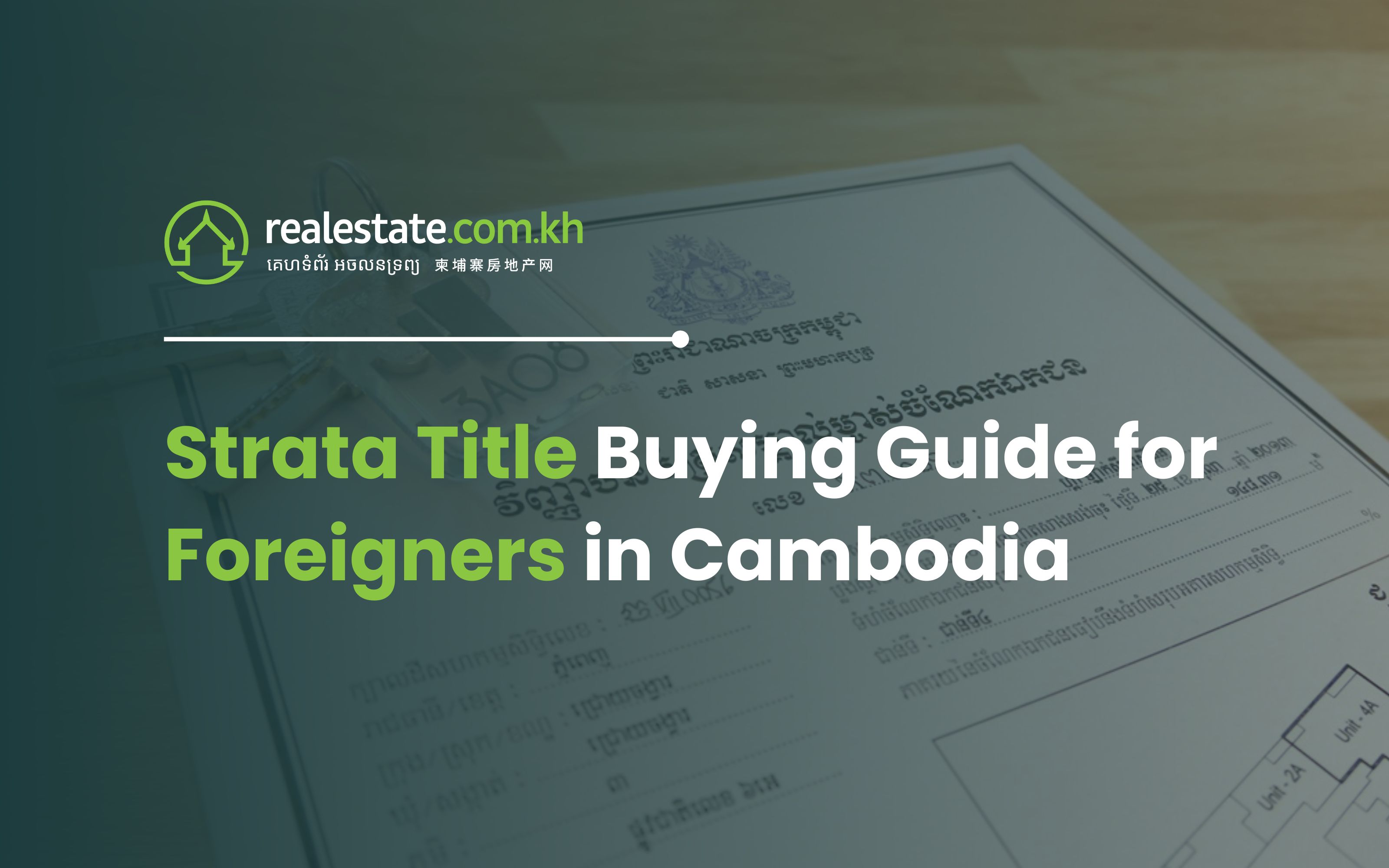![]()

Property tax can be an overwhelming topic to discuss, especially in an emerging market such as Cambodia. With policies yet to be polished, there are some tax considerations you should be aware of before entering into any transaction.
This is exactly what the CEO of Cambodia Investment Management Group, Anthony Galliano, tackled during his presentation at the Cambodia Real Estate Show in May this year.
Property Tax in Cambodia when Renting a Property:
If you’re a company renting an office, Mr. Galliano says you can rent from either a landlord who is a registered taxpayer or private individual that owns the property. If you’re a registered taxpayer, you’re responsible as a collection agent for withholding tax on rent for the government. Ideally the withholding tax should be deducted from the gross rent and a net rent paid, less the withholding tax, to the landlord. The withholding tax is paid to the government through the monthly tax return filing, by the registered taxpayer, who is the tenant/lessee.
If the Lessor is not a registered taxpayer, make sure the lease includes a clause to deduct the 10% withholding on rental. Most landlords will not accept paying the withholding tax and if the rental price is agreed as USD 1,000 a month the landlord would expect USD 1,000 a month, not USD 900, after withholding tax is deducted. Therefore, it is important to get the Lease Agreement right and include a clause for deducting withholding tax.
Meanwhile, the process should be straightforward when both parties are registered taxpayers. Galliano explains that when dealing with a non-registered taxpayer landlord, the registered taxpayer lessee acts as a collection agent for the withholding tax, if both the lessor and lessee are registered taxpayers, withholding tax and VAT apply.
Since landlords generally expect to be paid the monthly rental price agreed and tend to refuse to accept the withholding tax deduction from the rental price, it is best then to gross up the rent in these cases. Withholding tax is a non-deductible expense if paid by the lessee, over and above the rent. Quite simply, the lessee can gross up the rental price, by dividing the monthly rent by .9, and then deducting the withholding tax from this amount.
This may seem counterintuitive, but Mr. Galliano explains, “One main reason I always suggest this is that you could get the full benefit of the rent and the withholding tax paid.” This is beneficial when calculating your annual profit, a tax of 20% being applied, as you effectively reduce your profit by both the rent and withholding tax, by grossing up.
This benefits the landlord if they are a registered taxpayer too because they can claim the withholding tax credit against their profit tax, he says. Additionally, according to Instruction
18410 released last November, if a sub-lessee leases from a sub-lessor, then sub-lessee doesn’t have to pay withholding tax as long as the sub-lessor pays the withholding tax to the lessor.
Property Tax in Cambodia and Accommodation:
When it comes to the hospitality industry, hotels must charge customers an accommodation tax. The government’s definition of a hotel includes hotel apartments, suite hotels, motel, lodges, bungalows, guest houses, and tourist camps excluding flats or houses.
“If you provide hotel and accommodation services, then you should charge 2% on the room cost, inclusive of all other services. So, if somebody gets a massage or any other services, you should charge the tax on this service as well. You must charge on taxes as well except for the accommodation tax itself and the VAT. The tax is payable at the time of supply, according to Mr. Galliano.
Property Tax in Cambodia Related to Ownership:
Regarding property tax, Mr. Galliano mentions property tax was effective from January 1st, 2011. The tax payment is an annual obligation due by September 30th. Mr. Galliano further clarifies that “it’s effectively an annual tax on immovable property such as a condominium, a flat, or a villa. The property tax is applicable to individuals and companies.”
Property tax applies to land with or without a building, except for agricultural land and/or state land. Unused land is also taxed, however, this is a separate tax called unused land tax, according to Mr. Galliano.
To register to become a taxpayer for property tax, he explains that the first thing you must do under this law is to register at your tax branch. You only need to register the property if it’s worth $25,000 or more. You should go to your tax branch where the property is located and complete two forms: PT01 and PT02.
PT01 outlines the information about the property and PT02 is the property tax application itself. With regard to relevant documents for property ownership, he says: “You need to bring your ID card, birth certificate, or a passport; your residency or your family book or residency letter; certificate of immovable property, ownership or ownership issued by the cadastral in administration. You need your land sale purchase agreement when you bought the property, and you need to bring a water or electricity bill if you’re connected to show proof of address.”
Highlighting high property tax in the US and other countries and possible high property tax he concludes, “In the US, I think you’d probably pay a couple of thousand dollars on an average residential property.
Property tax in the US is very high. It’s mostly high in other countries as well. So, it’s pretty reasonable here now, which will probably change because the law’s only in effect since 2011.
I’m sure as years go by, we’ll see an escalation of the tax itself.” Specific tax law of Cambodia can be found on the General Department of Taxation website.
Realestate.com.kh, Cambodia’s home of real estate, has the most up to date information for buyers, sellers and property enthusiasts! Sign up for our newsletter today and stay up to date with the latest info...





Comments